Danish jazz bassist on his incredible musical journey and breaking into the NYC music scene
Exclusive interview with FBPO’s Jon Liebman
March 22, 2021
Chris Minh Doky is a bassist with many sides to his music. He got his start playing bass as a young musician in Denmark. In his teens, he moved to New York City, where he met and began playing with Mike Stern. Throughout his career, Doky has collaborated with the likes of Michael Brecker, John Scofield, Vince Mendoza, Ryuichi Sakamoto, David Sanborn, Trilok Gurtu, Michel Camilo, Al Jarreau, and Dianne Reeves. He’s also an internationally recognized musician in his own right, known for bringing an improvisational touch to his classical work, exploring the Scandinavian side of jazz with his New Nordic Jazz Project, and taking his jazz efforts in a more funky, rock-influenced direction with his group The Electric Nomads. Denmark’s Queen Margrethe II knighted Doky in 2010, recognizing him for his contributions to the arts and making him a distinguished member of the Royal Order of the Dannebrog. He has released numerous albums over the years, most recently 2018’s Transparency.
FBPO: You’ve got such an interesting story. Let’s start from the beginning. Tell me about your initial exposure to music and growing up in Denmark.
Doky: I was born into a family where there was a lot of music, although my dad was a doctor, he was a kidney specialist, and my mom was a nurse. My dad actually wanted to become was a classical guitarist, but in his family there were only two things you could be, either a doctor or a lawyer, so he chose doctor. All the kids in his family were sent to France to get their education, so in secrecy, while he was studying medicine, he also went to the conservatory and got an education as a classical guitarist.
FBPO: He’s from North Vietnam, right?
Doky: Yeah. My family is from Hanoi. My dad moved in ’48, before everything went haywire. So he was into music, and my mom was a singer in Denmark. She was actually pretty well known, had a few hits when she was 17, 18. And then she met my dad as a pen pal, and she moved to France, and they lived there for a long time. Then, while they were studying, they were gigging in Paris in various places. Once they had kids, my mom wanted to move back to Denmark, and my dad kept his music thing going by teaching guitar. My mom would sing in her spare time. So growing up, there was a lot of music in the household. And there was also an expectancy that the kids would learn to play an instrument, but not to become a musician. But that was about it.
FBPO: So you liked music, but never expected to make a career out of it.
Doky: As long as I could remember, I wanted to be a doctor, just like my dad, but music would find me all the time. The first time music found me, I was about 5 or 6, and I was playing on the floor. My dad was vacuuming, and I asked him, pointing at the piano, “How do you play piano?” And he started teaching me classical piano, and I got really into it. I never for a second thought I was going to use it for anything.
FBPO: How far did you go with your piano playing?
Doky: I just thought it was a lot of fun, but I remember when I decided I didn’t want to play piano anymore. I was 13. I had been playing piano for all that time, and I was going to competitions, and I had some real teachers and stuff. I had won a prize in one of these competitions. And at the ceremony, it was funny, because I remember my teacher told me, “You walk up the stairs, you turn around, you hold your hand on the piano, and you take a bow before you play,” and all this stuff. And I did that. And I saw all my friends from school that went to see that ceremony, but they weren’t sitting inside the hall. I saw them on the other side of the window, in the parking lot playing soccer. And I went, “That’s what I’ll do.” So I stopped playing piano there.
FBPO: Obviously, the love of music was still inside you, somewhere.
Doky: By chance, like a year later, I, by accident joined the Tivoli’s Boys Guard, which is a marching band, and I played classical percussion there. I had never played drums before. They had a kid that just left the marching band, and they asked me, “Do you play any of these instruments?” “No, I don’t.” “But do you read music?” “Yeah, actually I do.” So I played there. But again, that was just for shits and giggles.
FBPO: How did you end up gravitating to the bass?
Doky: When I started high school, a friend of mine that I met there was a really good guitarist. He started a band, and he needed a bass player. I was so tired of hearing him asking who would join the band every day. I had a beat up electric bass somebody had given me, because they didn’t know what to do with it, in my room. I had never played it or anything. I went to them and said, “Listen, when you find somebody, I have a bass you can have.” But I only got to say, “Listen, I have a bass…” And he said, “Welcome to the band!” We played a bunch of folk and R&B that I loved. Then one day he came to me and said, “I’d like to play some jazz.” And I was like, “Jazz? Yeah.” I didn’t have too much against it. I didn’t know much about it. And he gave me that album with Miles Davis, My Funny Valentine, and that blew me away!
FBPO: How much were you just going through the motions of playing bass at that time, as opposed to being really into it?
Doky: Oh, totally! I mean, when I got into the electric bass, I got into it as much as I was into classical piano, out of curiosity, to figure out what it was. And what I really dug about the electric bass was, I sat down and I figured out like, “Oh, okay, the bass plays the roots of the chords, but it has to hook up with the groove too.” And I figured, “Man, this is like the best spot in a band. You’re part of the harmony, and you’re part of the groove.” There’s no better place. And I started to figure out how that whole thing worked. I did that instantly, by just copying what I heard.
FBPO: Who were you bass influences?
Doky: It was James Jamerson. It was Bootsy Collins and Marcus Miller and all these people. And when I started doing the same thing with Ron Carter, I was bumming out. I couldn’t have that woody sound because I didn’t have an acoustic bass. I also sat down to figure out how this whole thing worked, and I got thrown. I got obsessed to figure out, “How the hell does this work?” because it sounded so good, and it felt three-dimensional. What would it be like to be able to play it? So that became an obsession of mine to figure it out. I mean, I was really into it when it was electric bass, but when I discovered Ron Carter, that was like… that was my intent, was just to figure it out, but I never thought that I was going to use it for anything. I was just obsessed with figuring out this jazz thing, what it was. We weren’t playing enough jazz in the band, so I sought out places where the more professional jazz guys played, and asked if I could get some tips, and I found out next to where I grew up there was a rehearsal space where they would jam all night. I went up there and asked if I could just hang out.
FBPO: And you were about how old at the time?
Doky: At this time, I was 16.
FBPO: When I hear Denmark, the first place my mind goes is to my all-time favorite upright player, Niels-Henning Ørsted Pedersen. How much does his presence still permeate the Copenhagen jazz scene?
Doky: It’s big, because he was amazing. Everybody always talks, still to this day, about Niels-Henning. But the funny thing was that what got me into the upright bass was not that tradition. It was the American tradition of Ron Carter. What Niels-Henning did for the acoustic bass is like what Jaco did for the electric bass. I loved all that stuff, but I was totally in the Ron [Carter], Paul Chambers, Ray Brown tradition. So I was kind of an outcast back then, because everybody at that time was trying to sound like Niels-Henning, and I was trying to sound like Ron Carter.
FBPO: When did you get your first upright?
Doky: I got it when I was trying to figure out how to work this jazz thing. I asked my mom and dad for an acoustic bass, and they looked at me like I was asking for crack or something. But I convinced them I was serious. And I got this really cheap, Chinese, plywood acoustic bass for my 17th birthday, and I got so into it. But still at this time it was just to figure out how the whole thing held together.
FBPO: How did your career get rolling?
Doky: I got a gig at La Fontaine, a jazz joint in Copenhagen, by accident. I became the house bass player there at 17, and I learned so much. My last year of school I didn’t sleep because I was playing Tuesday through Saturday from 11:00 p.m. to 4:00 a.m., so when I got to school I would just sleep and was totally out. And then I got called to a talk with the principal, and he said, “What’s happening? You smell like cigarettes and you sleep all day. Are you okay? Are you doing drugs?” I said, “No, I’m playing jazz.” But then I realized what was going on. I completely lost control or touch of what’s going on because I wanted to be a doctor, and I was destined to go to medical school. So I stopped everything that had to do with music and bass to concentrate on my school. I got the thing back on track, but I was miserable. I realized I just had to play music full-time. Long story short, when I got my parents’ blessing, at least for a while, to pursue music, I decided that I would go to where the music I loved originates from, and that was New York.
FBPO: Did you have anything lined up there, or did you just go for it?
Doky: I went for it! My brother had lived there, but he moved to Paris right before I got there. It was before the Internet, and I asked my brother, “What do you do when you go there?” He said, Get the Village Voice and look for apartments.” And that’s what I did. I landed at JFK and got the Village Voice and found a place in East Harlem.
FBPO: You were carrying a bass when you got off the plane?
Doky: Yep. I had an acoustic bass in a soft case that I checked in, and my electric bass in a soft case that I checked into with a suitcase.
FBPO: And you were all by yourself?
Doky: I’m all by myself.
FBPO: So, did you get in a cab? How did you leave the airport?
Doky: The first thing I did after going through customs, I went to the newsstand and I bought the Village Voice and sat down, got a coffee, and I found a couple of ads, and I called up. And there was one person saying, “Yeah, we have something available. Come on over.” And I jumped in a cab.
FBPO: With your big bass and your electric bass and your suitcase.
Doky: Yeah, with the bass sticking out the window on the back seat.
FBPO: You were in New York at such an incredible time. That generation of New York players, the Breckers and Mike Stern and Will Lee, and David Sanborn… How did you break into that scene?
Doky: I was lucky. I’ve been so lucky. It’s unbelievable how lucky I’ve been. But I was lucky in a sense that I got to New York and I had this list of stuff I wanted to do. And one of the things I wanted to do was to see Mike Stern at the 55 Bar. So that was the first thing I went down to see, and it completely blew me away. And it blew me even more away because Jaco showed up! But then money ran out quick.
FBPO: Yeah, that’ll happen in New York.
Doky: But I didn’t want to go back. And I didn’t want to tell my parents that I was out of money, because they would just say, “Come on back.” In fact, then you couldn’t call every day. It was expensive. I’d seen all these young people playing in the street, and I figured, I had an acoustic bass, I could do the same thing. So I started playing in the streets. And by playing in the streets, I started to get friends around my age that did the same thing, and they hipped me to, “Wow, you can go sit in with bands.” After we’d do the rounds there, we’d meet up at a place called Augie’s up on 106th and Broadway. Up at Augie’s, I met so many friends, like there was Larry Goldings and Mike Clark, a bunch of people that are still friends today. But we were all starting out. So they showed me the ropes. And Ben Perowsky and Joey Calderazzo, Kevin Hays, and, boy, so many people. And I did all of that, and I had a great time. I was really thin because I could not eat anything. Thankfully, Augie let us eat the fries that the guests didn’t finish!
FBPO: I love it. Keep going.
Doky: I did that for a couple of years, and then I didn’t have money, my phone was closed. But anyways, Mike Stern had heard about me. He asked Ben Perowsky for my number, and he called me and asked me if I wanted to come down and sit in with him, play at night with him at 55.
FBPO: Was Jeff Andrews playing bass?
Doky: Jeff Andrews was playing bass. Normally it was like Jeff Andrews and Adam Nussbaum, and then sometimes Ben Perowsky or Richard Morales or Lincoln Goines were there. But then I did that gig that night. Mike asked me if I wanted to go on the road with him. And I said, “Hell yeah!” And that changed my life in so many ways. Musically first of all, because I learned so much from playing with Mike. I still play with him. But I played with him like on every tour he did for many years back then. And through him I met Mike Brecker and Randy Brecker and I joined their band. And I did some with Scofield, and then I did something with Michel Camilo. But it all started with Mike stern, for sure.
FBPO: What’s keeping you busy these days?
Doky: For the last couple of years, I’ve been trying to concentrate on my own thing. I still do stuff with Stern, and I obviously still do a few things with other people, which I love. But I feel it’s nice to be my own boss now. Also, for the last three, four years, I’ve really found something I’m searching for, a voice I have that I’m trying to develop. That’s another reason why I’m trying to do mostly my own thing, so I can work on that continuously.
FBPO: What can you tell me about it?
Doky: Well, it’s kind of the thing that I realized I’ve been doing always, but being conscious of it makes it easier to distill it and develop it further. In a weird way, it’s a mix of my mom’s phrasing when she would sing to me. The way she phrases when she would sing to me is kind of the way I phrase when I play melodies, and the aesthetics of how she would sing is very influenced by her tradition, the Nordic singing tradition, so that’s a big part of it. But then the undercurrent of it is very much from my love and my affection for many years of being completely enthralled in the American tradition of rhythm. It’s a very melody-centric approach to the bass, but without letting go of the low end. Does that make sense?
FBPO: Yes, it does. Can I assume there’s a record in the making?
Doky: Oh yeah. Since I became very aware of that thing I wanted to distill and develop, the first one I did with that focus is the one called New Nordic Jazz. It’s not that it’s all of a sudden; it’s something that’s been present in all the albums I’ve done. So that one, and the one after that is called Transparency. The new one I’m working on now is a new trio because New Nordic Jazz and Transparency are with an acoustic trio of some Danish musicians that I’ve known all my life. I needed to start from the roots. Just like you can’t play the American tradition of jazz without people that have lived or live that life, the same way, you can’t really do the real Nordic experience without people that actually live the Nordic experience. The new trio is with Mino Cinelu and Gary Husband. And it’s a real cool trio. We continue down that path bass-wise, but the musical environment is also related to where the last two albums were, but it’s more open. It’s not so Nordic-centric. But bass-wise, we’re still in that direction.
FBPO: Tell me about your gear.
Doky: Instrument-wise, I have my acoustic that’s flyable, made by a luthier in Lyon, France, that is really, really good. You can remove the neck and you can collapse it so it’s in a little box not bigger than a big suitcase, which makes it easier to travel. And I have an upright electric that I was part of developing with Yamaha, called the Silent Bass. And the newest model is really cool. It’s called the Silent Bass 300. It’s an upright electric, and it’s got this computer model inside that when you play it you actually get the acoustics on it.
FBPO: Is that what Nathan East plays? He’s a Yamaha guy.
Doky: Yeah, he plays it sometimes too. Nathan and I did all the promo stuff together, which was really fun. It’s a great bass. I play that a whole lot. The acoustic bass I use more when I do the classical stuff, or more like classic jazz stuff. And then my electric. I used to play like 5-strings, 6-strings and all that, but as the years go by, I’m playing 4-strings more and more. Now I’m playing a Yamaha BBP34. It’s in between a Jazz bass and a Precision bass. It’s passive. And you can go old-school with it. You can rock out with it. But you could also do the more jazzy fusion stuff on it.
FBPO: Do you consider yourself more of an upright player or an electric player? Or would say it’s pretty evenly balanced?
Doky: Well, let me put it this way. I feel I can express myself more freely on the upright. Why? I don’t know. When I play the upright, I don’t feel like there’s something between what I want to say and how I say it. And with the electric, I feel I have an instrument in my hand. I play it a lot, and I love playing electric, and I’ve recorded and toured so much with electric, but I express myself more clearly and freely on the upright, for sure.
FBPO: What about amps?
Doky: I use Markbass amps. For a long time, I’d use a 4×10 with like an 800-watt amp with it, but like so many other players, a couple of years ago I went to play with in-ears. It was Dave Weckl that got me into that.
FBPO: What kind of strings do you use?
Doky: On my Silent Bass, I use Spirocores, top to bottom. On my acoustic, on the G string I use a Dominant. On the electric I use DR Strings, just the standard .45s.
FBPO: The ones with the pretty colors?
Doky: I tried those. They sound a little different.
FBPO: What do you think is important for someone to know who wants to learn to play bass?
Doky: The first order of business is to nurture your love of playing the bass. You should practice, yes. You should try to get better, yes. But the first order of business is always take care of your love of playing the bass. And the way to do that is, if you can’t play with somebody else, then play to records. And then take a break from playing with the records and play something else. And then work on some specific stuff you want to figure out on that song you might be playing. If it’s a walking bass, it could be like, what’s the difference between playing four different notes on your walking bassline and playing two notes repeated for each bar? What does that change in terms of the groove? Maybe like, when you want to go up higher on the string, how can you make intonation better? And it’s good, whatever it is, just be aware of what you play. And if you ask yourself a question, you could always figure out what would be cool to work with here. But I always say, never forget to nurture your love of playing, because sometimes you can get so enthralled of working stuff out. And we all know that feeling, beginners and advanced players. If you work on some stuff, and you work on it and you work on it, you get so frustrated, because the more you work on it, the more frustrating it can become, even though you do get better. And you go, “Oh, fuck it.” And that’s fine. But if you’re starting out, it’s important to never forget why you’re doing this. Because it’s fun as hell. It’s fun as hell! And if you get a little better at doing something in your playing, it’ll be even more fun. But if you let go of the fun aspect, then you risk of losing your love of what you’re doing, and that’s why you’re here to begin with.
FBPO: What would you be if you weren’t a bass player?
Doky: I was going to be a doctor, and then I had to stumble on music and get addicted to that. I’m so happy and thankful I did, but it’s not that I lost my interest in medicine either.
See Jon’s blog, with key takeaways from this interview here.
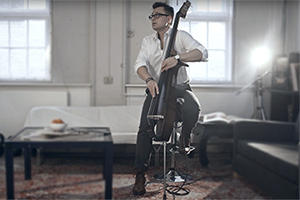
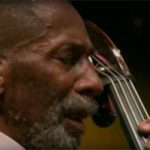
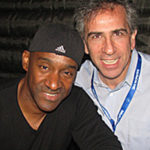
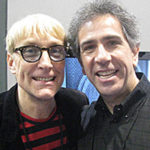
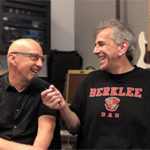
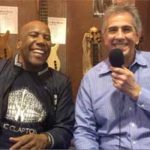
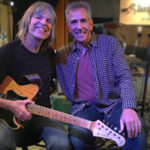
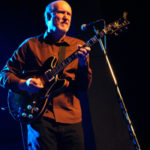

Hi Chris you probably don’t remember me but I used to drive for you. I just happened to heard somebody playing a basin kind of started thinking about you how are you how’s everything? I hope I’m fine you and good health and in good ferret. If? You ever get a chance say how I’ll say hello when you say hello take care